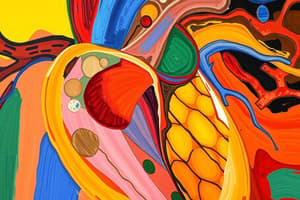Podcast
Questions and Answers
During which phase of the cardiac action potential does the resting membrane potential across the myocardial cell membrane reach about -90 mV?
During which phase of the cardiac action potential does the resting membrane potential across the myocardial cell membrane reach about -90 mV?
- Phase 0 (Depolarization) (correct)
- Phase 2 (Plateau)
- Phase 3 (Complete repolarization)
- Phase 1 (Early repolarization)
What causes the rapid upstroke of the action potential during Phase 0 of the cardiac action potential?
What causes the rapid upstroke of the action potential during Phase 0 of the cardiac action potential?
- Release of Ca2+ from the sarcoplasmic reticulum
- Inward Ca2+ current through L-type Ca channels
- Rapid Na+ influx by voltage gated Na+ channels (correct)
- Outward K+ current resulting in repolarization
Which phase of the cardiac action potential is characterized by inward Ca2+ current balanced by outward K+ current, resulting in little change in membrane potential?
Which phase of the cardiac action potential is characterized by inward Ca2+ current balanced by outward K+ current, resulting in little change in membrane potential?
- Phase 2 (Plateau) (correct)
- Phase 0 (Depolarization)
- Phase 3 (Complete repolarization)
- Phase 1 (Early repolarization)
What triggers muscle contraction in cardiac muscle during the plateau phase of the action potential?
What triggers muscle contraction in cardiac muscle during the plateau phase of the action potential?
What occurs during Phase 3 (Complete repolarization) of the cardiac action potential?
What occurs during Phase 3 (Complete repolarization) of the cardiac action potential?
What prevents tetany in cardiac muscle during the action potential?
What prevents tetany in cardiac muscle during the action potential?
During which phase does the cardiac muscle not respond to any stimulus?
During which phase does the cardiac muscle not respond to any stimulus?
What is the nature of the heart's ability to beat at regular intervals?
What is the nature of the heart's ability to beat at regular intervals?
Which node has the highest rhythmicity of discharge of cardiac impulses?
Which node has the highest rhythmicity of discharge of cardiac impulses?
What happens to heart rate as a result of sympathetic supply?
What happens to heart rate as a result of sympathetic supply?
What is the function of the enzymes Na+/K+-ATPase & Na+/Ca2+ exchange during Phase 4?
What is the function of the enzymes Na+/K+-ATPase & Na+/Ca2+ exchange during Phase 4?
Which factor decreases heart rate as a negative chronotropic factor?
Which factor decreases heart rate as a negative chronotropic factor?
What is essential for the heart's rhythmicity due to its mainly aerobic metabolism?
What is essential for the heart's rhythmicity due to its mainly aerobic metabolism?
Which phase corresponds to late phase 3 and allows the heart cell to begin responding to excitation again?
Which phase corresponds to late phase 3 and allows the heart cell to begin responding to excitation again?
Innervation of the heart by sympathetic supply increases rhythmicity of the whole heart including which part?
Innervation of the heart by sympathetic supply increases rhythmicity of the whole heart including which part?




